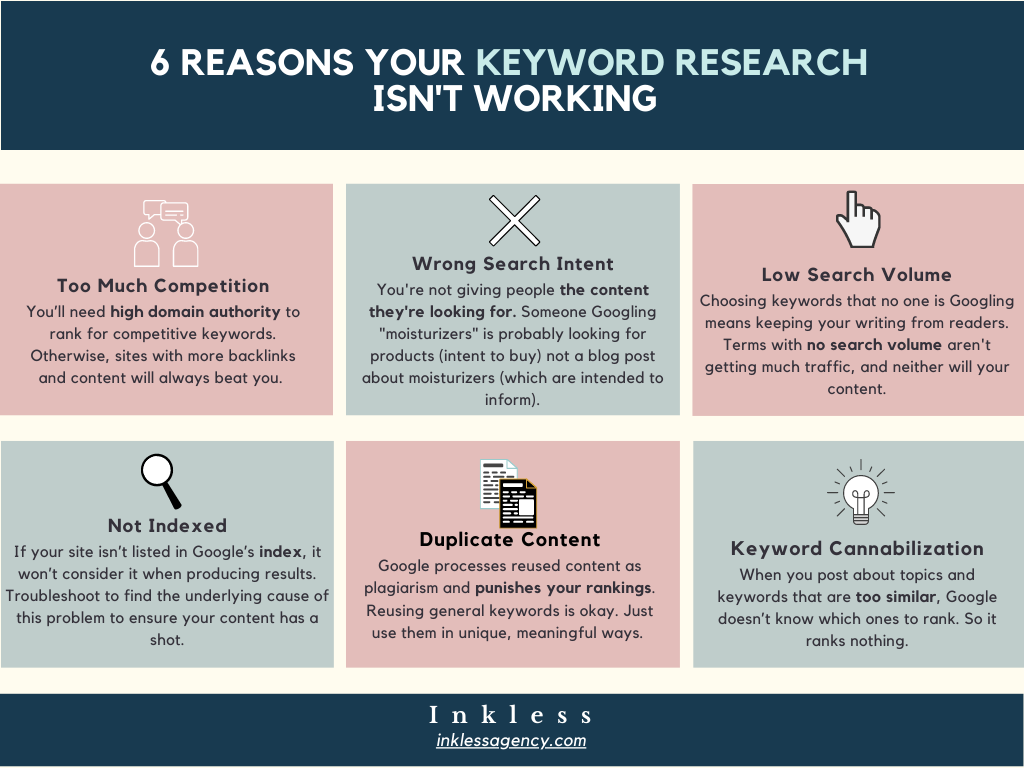You’ve put in the work, and you’ve paid your dues, but your online content still isn’t ranking. There’s only one thing left to ask: why?
There is a (frustratingly) large number of factors to keep straight when trying to rank on Google’s search results. If you’ve found yourself a bit lost in the sauce, you’re not alone.
Search engine optimization (SEO) is such a crucial skill that many people make entire professions out of it. You don’t need to be an expert to get results, though; you just need some guidance and a bit of luck.
Below, we’ll cover some of the most common reasons keyword research can fall flat.

1.) You’re Cannibalizing Keywords
Okay, so maybe you aren’t cannibalizing anything, but your keywords might be cannibalizing themselves.
When you post about topics and keywords that are too similar, Google doesn’t know which ones to rank.
After all, what’s the difference between “10 Things to Do This Summer” and “10 Tips for Having Fun This Summer?”
Google reads this as a sign that your information isn’t unique or adding something new to the conversation. When it doesn’t know which one to rank, it usually ranks neither.
In this way, your keywords are stomping all over each other, rendering each one useless.
Avoid this by choosing dynamic and interesting keywords of all kinds. Don’t post about the same topic twice, and if you must, ensure that the focus of each article is distinct.
2.) You’re Creating Duplicate Content
If you’re self-plagiarizing or copy-pasting content, it’s time to rethink your strategy. Duplicate content may save you time, but it sacrifices clicks.
Google processes duplicate writing as plagiarism and punishes your rankings as a result.
Of course, general keywords (i.e. something basic like “toys for dogs”) are okay. Just ensure you use them in unique, meaningful ways to show Google that you’re creating valid, new content.
3.) You’re Not Indexed by Google
If your site isn’t listed in Google’s index, it won’t consider it as an option when producing search results.
There are lots of reasons why you might not be indexed. If your site is new, recently purchased, or has been recently restructured, you might just need to wait a bit for it to join the index.
Otherwise, take steps to fix the underlying problem that’s keeping your content off Google.
Creating and submitting a site map is a good place to start. Learn more strategies from Google here.
4.) You’re Choosing High Competition Words with Low Authority
Keywords with a high amount of competition aren’t your best first target. You’ll need an established, high authority level to beat out the other competitors for these terms.
Think of it as the finals in a tournament; you can’t compete against the top five players if you haven’t proven you can beat everyone below them.
To build your domain authority, you need to get more backlinks. A backlink is a link to your site that’s found on another site.
Essentially, you need to show people use and gain something from your content to prove to Google that you’re credible enough to rank on the first page of search results.
You can score backlinks by:
- Writing engaging, helpful content that’s well-researched
- Guest posting or contributing to other sites
- Leveraging connections with other writers, businesses, influencers, etc.
- Submitting useful replies to HARO requests
- Create resources like guides, visual aids, etc.
Start with low-hanging fruit and opt for keywords with little competition.
Employ the tactics outlined above and begin to work your way up to ranking for words that will produce the most clicks.
5.) You’re Choosing Keywords with Low Search Volumes
While there’s no harm in choosing to let your message guide you instead of keywords, you still need to consider how to optimize your content for clicks. Choosing keywords that no one is Googling means keeping your writing from readers.
For example, if you have a travel blog, you might decide to write a post titled “Our Weekend in Cabo.” Sounds nice enough, but there’s a major issue: no one is really looking up the keyword “our weekend in Cabo.”
They might be searching for “weekend in Cabo,” but it’s more likely they’re looking for “things to do in Cabo” or “things to do in Cabo with kids.”
You can write the same post with the same content but significantly increase your readership by including keywords like these when appropriate.
6.) You’re Not Considering Search Intent
“Search intent” refers to the intention that most people have when searching for a particular keyword.
If someone Googles “best perfumes for teens,” for instance, they’re probably doing so with the hope of finding a list of products. Their intention is to buy, not to learn about what makes a perfume the best choice for teens.
That means that content that meets this intent will get more traffic and jump up in Google’s search results.
The best way to get a feel for a keyword’s search intent is by Googling it yourself.
If there are no blog posts, informational guides, etc., for a certain keyword, it’s probably not a good choice for long-form written content.
In other words, scope out the competition to see if you’re entering the right arena in the first place.
Key Takeaways
If your keyword research isn’t producing results, don’t lose hope. You can turn things around by brushing up on your SEO skills. Look out for errors like:
- Reusing keywords and content. If Google can’t tell what to rank, it won’t rank anything. It also penalizes what it reads as plagiarized content.
- Choosing the wrong keywords for your strengths and weaknesses. If you have low domain authority, now is not the time to shoot for the big leagues. Likewise, if you want to show up in search results, make sure you’re answering what people are actually looking up.
- Missing information. This can keep you off Google’s index or make it difficult for it to rank your content.
- Misunderstanding your purpose. If you want to write a post about something, make sure your content will fit what readers expect. You can do this by Googling your keywords and seeing what you find.
At Inkless, we’ve navigated our fair share of SEO ups and downs. Our years of experience creating optimized, engaging content help us deliver effective results.
We are avid storytellers, researchers, and innovators hoping to change the way we write and read on the web. You can count on us to go the extra mile to help you achieve your goals.
- We never miss a deadline.
- Our creative, optimized content helps organizations and businesses build trust among and connect with audiences.
- We write content that ranks well.
- Our services are personalized to meet your needs.
- Affordable pricing plans are available for organizations and businesses of any size.
To see the difference an Inkless writer can make for yourself, reach out via LinkedIn, by visiting our website, or by contacting info@inklessagency.com
